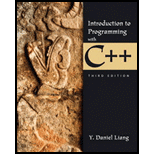
Show the output of the following code:
Want to see the full answer?
Check out a sample textbook solution
Chapter 1 Solutions
Introduction to Programming with C++
- how to read log logsarrow_forwardDiscrete Mathematics for Computer Engineeringarrow_forwardQuestion 1 - Array Iterators Like the JS on A2, there is no visual component to this question. The HTML really just needs to load the JavaScript, everything else will output to the console. The JS file should the completion of the task, and all necessary testing, so that just loading the file will complete the task with enough different inputs to ensure it works. Even Numbers [3 marks] Create a function that determines if a provided number is even. Define an array of numbers, then on the array use the appropriate array iterator to determine if the array contains only even numbers using the function you defined. Output the results, and test with several arrays. Long Names [3 marks] Define an array of names. Use an iterator to retrieve a new array containing only the names longer then 12 characters. Your iterator should be passed an anonymous arrow function. Test with several different arrays First Names [3 marks] Define an array called fullNames that contains 7 javascript objects of…arrow_forward
- Discrete Mathematics for Computer Engineeringarrow_forwardthis module is java 731 . make sure my answers are 1005 correct and the layout and structure is perfect and also include all comments etc. thank you i have attached question 1 (40 marks) and question 2 (30 marks ) this is question 3: Question3: (30 MARKS) Passenger Rail Agency for South Africa Train Scheduling System Problem Statement Design and implement a train scheduling system for Prasa railway network. The system should handle the following functionalities: 1. Scheduling trains: Allow the addition of train schedules, ensuring that no two trains use the same platform at the same time at any station. 2. Dynamic updates: Enable adding new train schedules and canceling existing ones. 3. Real-time simulation: Use multithreading to simulate the operation of trains (e.g., arriving, departing). 4. Data management: Use ArrayList to manage train schedules and…arrow_forwardthis module is java 731 . make sure my answers are 1005 correct and the layout and structure is perfect and also include all comments etc. thank you i have attached question 1 (40 marks) and question 2 (30 marks ) this is question 3: Question3: (30 MARKS) Passenger Rail Agency for South Africa Train Scheduling System Problem Statement Design and implement a train scheduling system for Prasa railway network. The system should handle the following functionalities: 1. Scheduling trains: Allow the addition of train schedules, ensuring that no two trains use the same platform at the same time at any station. 2. Dynamic updates: Enable adding new train schedules and canceling existing ones. 3. Real-time simulation: Use multithreading to simulate the operation of trains (e.g., arriving, departing). 4. Data management: Use ArrayList to manage train schedules and…arrow_forward
- this module is java 731 . make sure my answers are 1005 correct and the layout and structure is perfect and also include all comments etc. thank you i have attached question 1 (40 marks) and question 2 (30 marks ) this is question 3: Question3: (30 MARKS) Passenger Rail Agency for South Africa Train Scheduling System Problem Statement Design and implement a train scheduling system for Prasa railway network. The system should handle the following functionalities: 1. Scheduling trains: Allow the addition of train schedules, ensuring that no two trains use the same platform at the same time at any station. 2. Dynamic updates: Enable adding new train schedules and canceling existing ones. 3. Real-time simulation: Use multithreading to simulate the operation of trains (e.g., arriving, departing). 4. Data management: Use ArrayList to manage train schedules and…arrow_forwardDiscrete Mathematics for Computer Engineeringarrow_forwardTask 1: Write an abstract class Method +: public -: private #: protected Underline: static # input: int # output:String Method + isHard():boolean + specificWay():String + Method() + Method(input: int, output: String) + getInput(): int + setInput(input: int): void + getOutput(): String + setOutput(output: String): void +toString(): String Question Task 2: Write a class ReadMethod that extends the Method class. +: public -: private #: protected Underline: static -language: String ReadMethod Question + ReadMethod() + ReadMethod(input: int, output: String, language: String) + isHard():boolean + specific Way(): String +toString(): String + getLanguage(): String + setLanguage(language: String): voidarrow_forward
- i have attatched my java question , please make sure it is answered correct, include all comments etc, thank youarrow_forwardi have attached my 2 java questions . please answer them correctly, add all comments etc . thank you.arrow_forwardCan you help me solve this problem using Master's Theorem:Solve the recurrence relation f(n) = 3af(n/a) + (n + a)2 with f(1) = 1 and a > 1 byfinding an expression for f(n) in big-Oh notation.arrow_forward
 EBK JAVA PROGRAMMINGComputer ScienceISBN:9781337671385Author:FARRELLPublisher:CENGAGE LEARNING - CONSIGNMENT
EBK JAVA PROGRAMMINGComputer ScienceISBN:9781337671385Author:FARRELLPublisher:CENGAGE LEARNING - CONSIGNMENT C++ for Engineers and ScientistsComputer ScienceISBN:9781133187844Author:Bronson, Gary J.Publisher:Course Technology Ptr
C++ for Engineers and ScientistsComputer ScienceISBN:9781133187844Author:Bronson, Gary J.Publisher:Course Technology Ptr Microsoft Visual C#Computer ScienceISBN:9781337102100Author:Joyce, Farrell.Publisher:Cengage Learning,
Microsoft Visual C#Computer ScienceISBN:9781337102100Author:Joyce, Farrell.Publisher:Cengage Learning, C++ Programming: From Problem Analysis to Program...Computer ScienceISBN:9781337102087Author:D. S. MalikPublisher:Cengage Learning
C++ Programming: From Problem Analysis to Program...Computer ScienceISBN:9781337102087Author:D. S. MalikPublisher:Cengage Learning EBK JAVA PROGRAMMINGComputer ScienceISBN:9781305480537Author:FARRELLPublisher:CENGAGE LEARNING - CONSIGNMENTProgramming Logic & Design ComprehensiveComputer ScienceISBN:9781337669405Author:FARRELLPublisher:Cengage
EBK JAVA PROGRAMMINGComputer ScienceISBN:9781305480537Author:FARRELLPublisher:CENGAGE LEARNING - CONSIGNMENTProgramming Logic & Design ComprehensiveComputer ScienceISBN:9781337669405Author:FARRELLPublisher:Cengage





